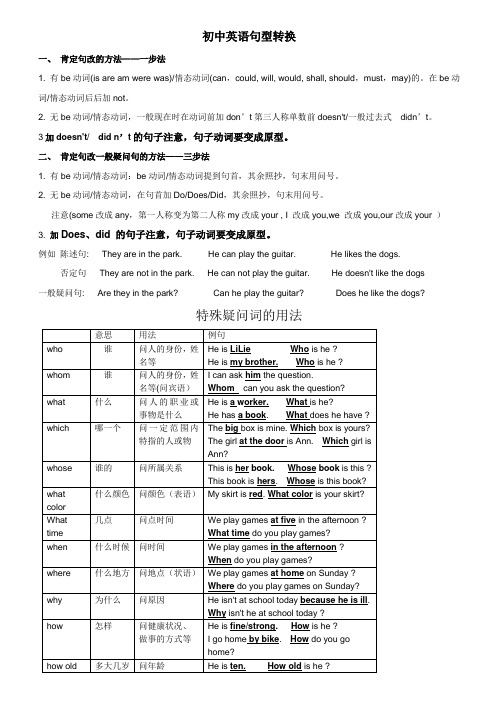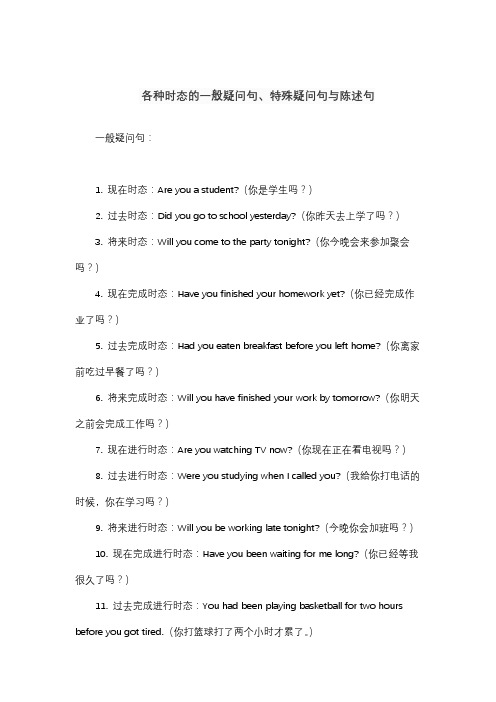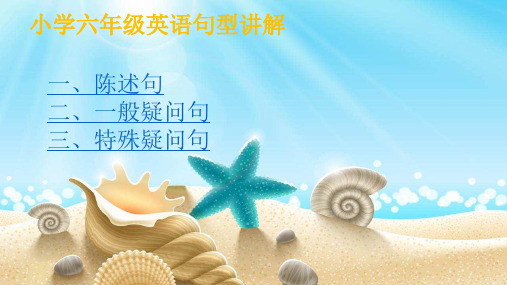陈述句、一般疑问句、特殊疑问句
(完整版)初一特殊疑问句----简单句(特殊疑问句)

简单句:1.陈述句:肯定句否定句I am a student. I like English.I am not a student. I don’t like English.2.疑问句:一般疑问句:(用yes/no 作答,就能准确答出)I am a student. -------------Am I a student? Are you a student?He is a student. -------------Is he a student?找动词动词跳一跳am is are 跳到句首找动词动词加一加加Do/DoesI love you Do I love you ? Do you love me?I like English Do I like English Do you like English?He has a pen. Does he have a pen?特殊疑问句:(用yes/no回答很搞笑)不能用yes/no回答要回答出细节。
你今天早上吃什么啊?你叫什么名字?选择疑问句反意疑问句3.感叹句:How/What 引导4.祈使句:要求/命令/请求(You) Go out!(You) Stand up!Sit down!特殊疑问句:提问----用一个词提问特殊疑问词What(什么)What is it ?Where (哪里) Where are you ?How (怎样..如何…) How old are you?Whose(谁的)Whose pen is this?Which(哪一个)Which is right?When(什么时候)When is your birthday ?Who(谁)Who are you ? Who is she?Why(为什么)Why do you think so?特殊疑问句1.陈述语序她在唱歌She is singing there.Who is singing there?[对主语提问直接用陈述句语序]2.疑问词+“一般疑问句”回顾一般疑问句:(1)含be 动词I am a student –Am I a student?(大脑进了某种液体) Are you a student?He is student-----Is he a student?[找动词动词跳一跳am is are 跳到句首](2)不含be动词I love you------Do you love me ?He loves you-------Does he love you?[找动词动词加一加加Do/Does ]I love English. Who loves English?What do you love?特殊疑问句两种构成A.当疑问词或者疑问词修饰的词作主语/对主语提问, 用疑问词+陈述语序Who loves English B…..不做主语,疑问词+一般疑问句What do you love?Where is my schoolbag?初一常见疑问词1.Who 10.what time 19.How soon2.Whom 11.What color 20.How heavy3.Whose 12.what size4.What 13.How many5.Which 14.How much6.Where 15.how long7.When 16. How far8.Why 17. How often9.How 18.How big特殊疑问句练习:就划线部分提问My school bag is on the desk.(1) (2)(3)(1)Whose school bag is on the desk?(2)Where is my school bag?(3)What is on the desk?He has three balls.(1) (2)_______(3)(1)Who has three balls?(2)How many balls does he have?(3)What does he have?She likes bananas.(1)(2)(1)Who likes bananas?(2)What does she like?The soccer ball is 6 dollars.(1)(2)(1)What is 6 dollars?(2)How much is the soccer ball?My birthday is on June 3rd.(1)(2)(1)Whose birthday is on June 3rd(2)When is your birthday?Bob’s favorite subject is art.(1)(2)(1)Whose favorite subject is art?(2)What’s your favorite subject?。
初中英语句型转换(陈述句变一般疑问句特殊疑问句及练习)

3 加 doesn't/ did n’t 的句子注意,句子动词要变成原型。
二、 肯定句改一般疑问句的方法——三步法
1. 有 be 动词/情态动词:be 动词/情态动词提到句首,其余照抄,句末用问号。
2. 无 be 动词/情态动词,在句首加 Do/Does/Did,其余照抄,句末用问号。
注意(some 改成 any,第一人称变为第二人称 my 改成 your , I 改成 you,we 改成 you,our 改成 your )
Can he play the guitar?
Does he like the dogs?
特殊疑问词的用法
who whom what which
whose what color What time when where why how
how old
意思 谁 谁
什么 哪一个
谁的 什么颜色
用法 问人的身份,姓 名等 问人的身份,姓 名等(问宾语) 问人的职业或 事物是什么 问一定范围内 特指的人或物
how long 多久
问一段时间, He has lived here for a year.
问物体的长短 How long has he lived here?
The desk is one meters long.
How long is the desk ?
how often 多久
问频率
I go to see my parents once a month.
一般疑问句: Are they in the park?
Can he play the guitar?
Does he like the dldren have a good time in the park. 否定句:___________________________________ 一般疑问句:___________________________________ 2. There are about nine hundred people at the concert.(音乐会) 否定句:_________________________________ 一般疑问句:________________________________________ 对划线部分提问:____________________________________ 3. There is only one problem. 否定句:_____________________________________ 一般疑问句:________________________________________ 肯定/否定回答:____________________________________ 4. Ann does her homework every evening. 否定句:__________________________________________ 一般疑问句:________________________________________ 对划线部分提问:____________________________________ 5. I read an English book every day. 否定句:__________________________________________ 一般疑问句:________________________________________ 肯定/否定回答:____________________________________ 对划线部分提问:____________________________________ 6. My brother is in the park now. 否定句:____________________________________ 一般疑问句:________________________________________ 肯定/否定回答:__________________________ 对划线部分提问:____________________________________ 7. She has some bread for lunch today. 否定句:__________________________________________ 一般疑问句:_________________________________ 肯定/否定回答:____________________________________ 8. They read English every day. 否定句:___________________________________ 一般疑问句:________________________________________ 肯定/否定回答:____________________________________ 对划线部分提问:____________________________________
陈述、一般疑问句、特殊疑问句(一)

把陈述句变为否定句
6.The boy in black likes music. 7.We usually have four lessons in the morning. 8.I will teach you English. 9.Mr. White lives and works in New York. 10. Her house is far from the school. 11. His father works at school. 12.He can come at 8 a.m. 13. He bought a new house last year.
特殊疑问句
一、定义:以特殊疑问词开头,对句中某一成分 进行提问的句子。(句末用问号,朗读用降调。)
二、与一般疑问句的区别 1.特殊疑问句所提问的是一个不知道的内容。 2.特殊疑问句要使用特殊疑问词。回答的时 候要根据实际情况来回答,而不能用yes/no 回答。
三、语序 1.对主语或主语的定语进行提问时: 疑问词(主语)+谓语动词+其他成分? 例如:Who is singing in the classroom? Whose book is it? 2.对其他成分进行提问时: 疑问词+一般疑问句? 例如:Where are you from? How do you go to school?
Review
1.They often play games. (变一般疑问句) 2.There is some milk in the bottle. (变否定) 3. Are these elephants?(做肯定回答) 4. Duck can swim.(变一般疑问句) 5. There are two lakes in the nature park.(变否 定句) 6. He’s active.(变一般疑问句) 7. She can fly a kite. (变一般疑问句)
疑问句大全——_一般疑问句、特殊疑问句、选择疑问句、反意疑问句

疑问句(questions)指提出问题,请对方回答的句子。
疑问句句末要用问号。
按结构可分为四种:一般疑问句、特殊疑问句、选择疑问句、反意疑问句。
(一)一般疑问句1、一般疑问句概述一般疑问句(general questions),也可称为“yes/no” questions(是否型问句),因为它一般是由yes或no 回答的,如:—Can you swim to the other side?你能游到对岸吗?—Yes, I can.是的,我能。
—No,I can’t.不,我不能。
—Have you locked the door?你锁门了吗?—Yes,I have.是的,锁了。
—No,I haven’t. 不,没有锁。
2一般疑问句的结构(1)基本的结构为:be/助动词/情态动词+主语+谓语/表语+(其他),句子要读升调,如:Are they your friends?他们是你的朋友吗?Does he go to school on foot?他是步行去上学吗?Will you be free tonight?你今晚有空吗?Can you play basketball?你会打篮球吗?(2)陈述句亦可用作一般疑问句,多用在非正式文体中,句末有问号,用升调,如:Somebody is with you?有人和你一起吗?He didn’t finish the work?他没有做完活吗?You are fresh from America,I suppose?我猜,你刚从美国回来吧?3、一般疑问句的答语(1)一般疑问句一般由yes或no来回答,如:—Are you tired?你累了吗?—Yes,I am.是的,累了。
—No, I’m not.不,不累。
—Does she do the cleaning?她扫除了吗?—Yes ,she does.是的,她打扫了。
—No,she doesn’t.不,她没打扫。
小学英语句型转换陈述句变一般疑问句特殊疑问句及练习

小学英语所有句型转换的方法根本助动词只有三个:be, do, have, 他们没有词汇意义,只有语法作用,如协助构成进展体,完成体,被动态,否认句,疑问句等。
一、肯定句改否认句的方法——一步法1、在be动词后加not。
如:is not ,are not ,am not,was not,were not;2、在can,等后加not。
如:cannot3、上述都没有的,在动词前加助动词否认形式do not, does not. (don’t/doesn’t)4、some 改成any。
二、肯定句改一般疑问句的方法——三步法1、把be动词放在句首,剩下的照抄,〔some 改成any,my改成your等〕句点改成问号。
2、把can,等放到句首,剩下的照抄,〔some 改成any,my改成your等〕句点改成问号。
例如:陈述句: They are in the park. He can play the guitar.. 一般疑问句: Are they in the park? Can he play the guitar?把以下句子变成一般疑问句1. I am listening to music._______________________________________2. Mike is a student._______________________________________3. Sarah can clean the classroom.________________________________________4. They are in the zoo.________________________________________5. There are some flowers in the vase.________________________________________6.This is my sister._________________________________________7.We are sweeping the floor.__________________________________________3、上述都没有的,在句首请助动词Do/Does帮助,剩下的照抄,〔some 改成any,my改成your等〕句点改成问号。
各种时态的一般疑问句、特殊疑问句与陈述句

各种时态的一般疑问句、特殊疑问句与陈述句一般疑问句:1. 现在时态:Are you a student?(你是学生吗?)2. 过去时态:Did you go to school yesterday?(你昨天去上学了吗?)3. 将来时态:Will you come to the party tonight?(你今晚会来参加聚会吗?)4. 现在完成时态:Have you finished your homework yet?(你已经完成作业了吗?)5. 过去完成时态:Had you eaten breakfast before you left home?(你离家前吃过早餐了吗?)6. 将来完成时态:Will you have finished your work by tomorrow?(你明天之前会完成工作吗?)7. 现在进行时态:Are you watching TV now?(你现在正在看电视吗?)8. 过去进行时态:Were you studying when I called you?(我给你打电话的时候,你在学习吗?)9. 将来进行时态:Will you be working late tonight?(今晚你会加班吗?)10. 现在完成进行时态:Have you been waiting for me long?(你已经等我很久了吗?)11. 过去完成进行时态:You had been playing basketball for two hours before you got tired.(你打篮球打了两个小时才累了。
)12. 将来完成进行时态:By this time next week, you will have been living in this city for five years.(到下个星期这个时候,你就会在这个城市生活五年了。
)特殊疑问句:1. 现在时态:What is your name?(你叫什么名字?)2. 过去时态:Where did you go on vacation last year?(去年你去哪里度假了?)3. 将来时态:How will you get to the airport tomorrow?(明天你怎么去机场?)4. 现在完成时态:What have you done so far today?(今天到现在为止,你都做了什么?)5. 过去完成时态:When had you finished your work before he arrived?(他到达之前,你已经完成了工作吗?)6. 将来完成时态:How much money will you have saved by the end of the year?(到年底为止,你会存多少钱?)7. 现在进行时态:What are you doing right now?(你现在在做什么?)8. 过去进行时态:What were you reading when I came in?(我进来的时候,你在读什么?)9. 将来进行时态:What will you be doing at this time tomorrow?(明天这个时候,你会在做什么?)10. 现在完成进行时态:What have you been up to lately?(最近你在忙些什么?)11. 过去完成进行时态:What had you been doing all morning before I called you?(我给你打电话之前,你整个早上都在忙什么?)12. 将来完成进行时态:What will you have been studying for three years by the time you graduate?(到你毕业的时候,你会已经学了三年的什么课程?)。
陈述句、一般疑问句和特殊疑问句

肯定句否定句转换习题。
1. Tom and Mike are friends. 2. I’m a students. 3. There are some books in the study. 4. Your father can ride a bike. 5. They can play football after school. 6. We come from China. 7. He likes playing basketball. 8. Have some bread, Tom. 9. Don’t eat food in the study. 10.We can’t swim. 11.They aren’t friends. 12.You aren’t my friends.
二、一般疑问句(一般读升调)
(一)什么是一般疑问句 用yes或no回答的疑问句叫作一般疑问句。
(二)一般疑问句特征 以be(am, is are)动词,情态动词(can, should, will…)以及以助动词(do, does) 开头的疑问句。注意:通常读升调
1. Is he a student? 2. Can you swim? 3. Do you like apples?
ห้องสมุดไป่ตู้
7. whose对物体的所属提问,意为:谁的,Whose bike is this? 8. how对方式和程度提问,意为:怎么 How do you come to school? 9. how many对可数名词数量提问,意为:多少,
How many books do you have? 10. how much ①对不可数名词数量提问,意为:多How much rice do you need ②对物体的价格提问,意为:多少How much is this ruler? 11. how old 对年龄提问,意为:多少岁How old are you ? 12. how long对长度提问,意为:多长 How long is your hair.
英语中把陈述句改为一般疑问句和特殊疑问句

将陈述句改为否定句,一般疑问句和特殊疑问句一、将肯定句变为否定句1、谓语动词是be 动词,助动词have, has, will,情态动词can 等时,只要直接在这些词后面加not 就构成否定形式。
eg. Lily has already read this new book. (改为否定句) Lilythis new book.2、谓语动词是行为动词而又没有助动词或情态动词时,必须在谓语动词前加助动词,一般现在时加助动词do ,第三人称单数加does,一般过去时加did,再和not 构成否定结构。
必须指出的是:don't, doesn't, didn't 后都用动词原形。
eg.1)Jill has lunch at school every day. (改为否定句) Jilllunch at school every day.2)T he children had a good time at the party. (改为否定句) Thechildren a good time at the party.3)R ose didn't drink any milk this morning.(改为肯定句) Rosemilk this morning.二、陈述句变一般疑问句A.一般疑问句:以be 动词, have /has/do 等助动词、can/may 等情态动词开头,以yes 或no 来回答的问句。
它的基本结构是:Be/Have /Has/Did 等助动词(包括情态动词)+主语+谓语+┄?回答常用简略回答。
1、谓语动词是be 动词、助动词、情态动词时,只要直接把这些词置于句首,句末改成问号。
eg. There's something wrong with his bike.(改成疑问句)wrong with his bike?2、谓语动词是行为动词时,必须在句首加上助动词Do、Does(三单)、Did(过去式)加上这些助动词后,句子中谓语动词必须用原形。
- 1、下载文档前请自行甄别文档内容的完整性,平台不提供额外的编辑、内容补充、找答案等附加服务。
- 2、"仅部分预览"的文档,不可在线预览部分如存在完整性等问题,可反馈申请退款(可完整预览的文档不适用该条件!)。
- 3、如文档侵犯您的权益,请联系客服反馈,我们会尽快为您处理(人工客服工作时间:9:00-18:30)。
Does she clean her room every day? Yes, she does.
Is Anna′s father a doctor? No,he isn′t.
如果主语是 this that,回答时用 it 代替,如果问句中主 语是these, those回答时用 they代替。
B:They are 25 yuan.
6、A: What colour is the cup?
B:It’s blue.
7、A: What day is it today?
B:It’s Sunday.
8、A: What day was it yesterday?
B: It was the 13th of October.
例:Is your father a teacher?
Does Catherine like animals?
Can Jenny speak French? 2、往往读升调; 3、译成汉语,都可以带上“吗”, 例如上面三句可分别译为:你父亲是老师吗?
凯瑟琳喜欢动物吗?詹妮会说法语吗?
(二)、如何将陈述句变成一般疑问句?
2.如果句中有some, 则变问句时往往要变成any
There is some water on the playground. →Is there any water on the playground?
3.复合句变一般疑问句通常只变主句,从句 不变。 例:I know he comes from Canada.
9、A: What about this red one?
B:It’s beautiful.
10、A: How old is your cousin?
B: He’s 15 years old.
who 谁(问人)
what place什么地点问具体地址
whose 谁的 问主人
how …怎么样 问情况
where 在哪里 问地点
how old 多大 问年龄
which 哪一个 问选择
how many 多少 问数量
why 为什么 问原因
how much 多少 问价钱
what 什么 问东西
how about …怎么样 问意见
就划线部分提问(变特殊疑问句)
This is a book. 第一步:变一般疑问句 Is this a book? 第二步:找合适的特殊疑问词 Is this what ? 第三步:特殊疑问词提前放到句首,并大写, 其余按顺序照抄,省略划线部分。What is this?
没有am, is, are的句子
what time 什么时间 问时间 how far 多远 问路程
what colour 什么颜色 问颜色 how long 多长 问时间
what about…怎么样 问意见 How soon 多快,多久 问时间
what day 星期几 问星期
How often多久 问频率
(三)小学阶段特殊疑问句句型结构有: 1、特殊疑问词+助动词+主语+动词原形+其 他?
1.如果陈述句中有第一人称,则变问句时最好 要变为第二人称。
I usually have lunch at school. →Do you usually have lunch at school?
My father is playing soccer. →Is your father playing soccer?
他去上学 He goes to school.
2.否定句:表示否定的意思。 例:我不是一个男孩。 I am not a boy
他不去上学 He does not go to school.
二、一般疑问句 (一)、什么是一般疑问句
用Yes或No作答的疑问句叫一般疑问句。一般疑问句还有下列特点:
1、以be动词、助动词或情态动词开头;
→Do you know he comes from Canada?
4.如果句中含有实义动词have且表示“有 ”时,除借do外,也可将其直接提到句首。 例:I have some friends in America.
→Do you have any friends in America? /Have you any friends in America?
就划线部分提问:I like English.
第一步:先变一般疑问句
Do you like English?
第二步:找合适的特殊疑问词代替划线部分
Do you like what?
第三步:特殊疑问词提前放到句首,并大写 ,其余按顺序照抄,省略划线部分。
What do you like?
★特殊:
1.some变为any。
(四)、一般疑问句的回答
一般疑问句往往采用简短回答,共由三部分(三个单词)组成 ,对这三部分(三个单词)的确定可以概括例下:
1.第一个词:不是Yes就是No。(注意:有时根 据语气的不同,Yes可由Sure, Certainly, Of course等 代替.No可由sorry 代替.)
2.第二个词:问谁答谁。即答语中的主语须与
2.and变为or。
如: I have a knife and a ruler.
→I don't have a knife or a ruler.
3.a lot of (=lots of)变为many或much。如:
They have a lot of friends.(可数名词)
→They don't have many friends.
1.看句中有没有
be动词(am、is、 are、 was、 were)、 助动词(do、does、did、 have、had)、 情态动词(can、must、will、may等), 如果有,将其提到句首,句末打上问号即可。
例:It was rainy yesterday. →Was it rainy yesterday?
如:There are some birds in the tree.
→There aren't any birds in the tree.
但是,若在表示请邀请、请求的句子中,some可以不变。 如: Would you like some orange juice?
与此相关的不定代词如something, somebody等也要进行相应变化。
May I go to the park now? Yes, you may. /No, you mustn′t.
Must I wash my clothes now? Yes, you must. /No, you needn′t.
4.用No开头作否定回答时,结尾要加上 not。因 为回答必须是三部分,所以否定回答必须缩写,而
There is lots of orange in the bottle.(不可数名词)
→There isn't much orange in the bottle.
一、在横线上填上适当的疑问代词 1、A: Who is the boy in blue?
B:He’s Mike. 2、A: Whose pen is it?
第三步:特殊疑问词提前放到句首,并大写,其余按
顺序照抄,省略划线部分。
例如:肯定句、否定句和一般疑问句的互换
肯定句:This is a book. 否定句:This is not a book. 一般疑问句:Is this a book? 肯定回答:Yes, it is. 否定回答:No, it isn’t.
肯定回答不能缩写。例:
Did Thomas come here yesterday? Yes, he did./ No ,he didn′t.
三、特殊疑问句
(一)以疑问词开头,对句中某一成分提问的句子叫特殊疑问句。 (二)常用的疑问词有:
when 什么时间(问时间) what date 什么日期 问具体日期
c、如果谓语动词是过去式,则借did.
需要注意的是,借does或did后,原句的谓语动词要变回原形。
例:The students saw a film yesterday. →Did the students see a film yesterday?
(三)、陈述句变一般疑问句应注意的事项
陈述句变成一般疑问句除了遵循上述规则以外,还应注意下列几点:
顺序照抄,省略划线部分。 4.划线部分不能在特殊疑问句中出现。非三单时用do, 三单时用does
例:非三单 . 肯定句:I like English 一般疑问句:Do you like English? 否定句:I do not like English.
三单
肯定句:He likes English. 一般疑问句:Does he like English? 否定句:He does not like English.
Tom's father can play the piano. →Can Tom's father play the piano?
I have finished my homework.→Have you finished your homework?
2.如果没有be动词、助动词、情态动词,
则根据动词的形式借助do的相应形式放在句首。具体方法 是:
B:It’s mine. 3、A: Where is the diary?
B:It’s under the chair. 4、A: When is the Chirstmas Day?
B: It’s on the 25th of December. 5、A: How much are the earphones?
